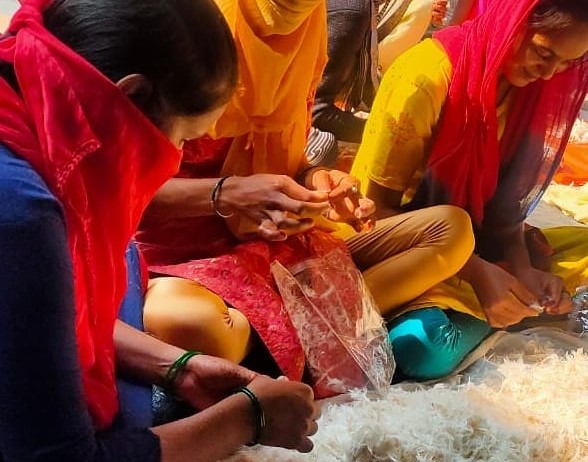The unique fabric of Women on Wings’ business partner Mudita & Radhesh Pvt Ltd gets global recognition. The innovative fabric is made from feathers of chicken butchery waste and one of its stoles recently has been awarded the Gold Award from Prestigious Business World 2021. Earlier this year, the fabric was awarded Gold in the German Design Award 2020-2021 and only last month Mudita & Radhesh Pvt Ltd got selected in Top 10 Nominees by IKEA Foundation in its ‘No Waste Challenge’.
The innovation
Mudita & Radhesh Pvt Ltd (M&R) has developed a new natural ‘wool like’ fiber by up-cycling feathers of chicken butchery waste. These feathers are spun into yarn which is ten times warmer, softer, and durable than any other existing natural and manmade fiber. The feather wool is created in a unique 26 steps sanitization eco-friendly patented process. The low cost input raw material for handloom is a serious competitor to ‘traditional’ woolen apparels. Tribal women and artisans who are getting trained by M&R, make various products like running cloth, quilts, shawls, jackets, etc.. Tribal women use hand carding, spinning, weaving to make these beautiful products.
The larger impact of M&R
Through this innovation, M&R’s social impact not only generates livelihoods for over 200 tribal women in in backward areas of Jhalawar, Rajasthan. It also reduces carbon footprint, and solves food waste, health hazards and environmental problems. Till date M&R has saved 350,000 tons of chicken butchery waste from going into landfills and water bodies and turned those into yarn which is ultimately being turned into home furnishing, clothes and accessories. The Awards mentioned above were not the first for M&R. Last year and in 2019, its unique innovation already got recognized in the Ageus Graham Bell Award for Innovation in Clean Tech (2020) and two times in the CII Design Excellence Award – for Design and Social Impact and Sustainability and for overall Category of Industrial Design.
M&R and Women on Wings
M&R has been a partner of Women on Wings since December 2020. The social enterprise aims is to setup multiple tribal handloom villages in various regions of India. These villages will be fully equipped as chicken butchery waste processing and handling units. The units will e.g. include handloom training and R&D centers, schools, health clinic, women counselling, and also handicraft tourism village homes. A first village of this kind is setup in the Indian state of Rajasthan and a second is planned for Madhya Pradesh state. These two villages alone would employ 2,000+ tribal women, creating livelihoods for over 2,000 families.



